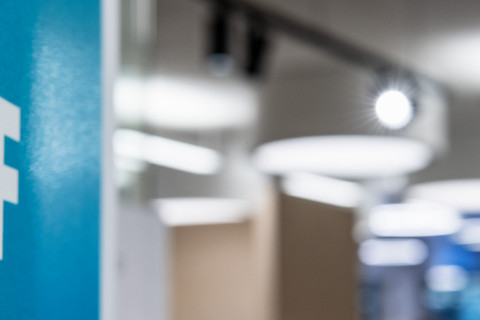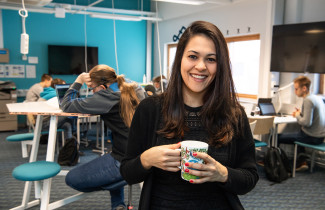Linus Awuniji had many roads to choose from after finishing his bachelor’s degree in mechanical engineering in his home country, Nigeria, as he received several job offers from different fields.
- I was drafted as a Mechanical Engineer into the Nigerian Navy and secured placement with a Nigerian Anti-Corruption Agency. I decided not to take either of these paths but instead opted to pursue further education, remembers Linus.
- I was drafted as a Mechanical Engineer into the Nigerian Navy and secured placement with a Nigerian Anti-Corruption Agency. I decided not to take either of these paths but instead opted to pursue further education, remembers Linus.
While figuring out, where and what he would begin to study, Linus met a Senior Researcher from UEF. Through this person, Linus got to know more about research work at UEF and realized that the university offered many options for career prospects after graduation.
- All the information about the programs was well presented on UEF’s website. I found the possibility to do practical work in co-operation with the hospital and companies especially attractive. It was a choice between studies in Finland or Hungary, as I had received a scholarship for master’s degree studies in these countries, tells Linus.
What made Linus choose UEF and continue to PhD studies at the university after finishing his master’s degree?
Interdisciplinary fields are the key to innovation in the future
Linus finds interdisciplinary fields interesting. He believes that in the future, more innovations will arise from the intersection of disciplines. This is also why he believes that people with experience and skills in interdisciplinary fields will have more options in the future.
- I’m interested in the application of engineering skills in medicine. I’m also a very curious person and like to know why things work the way they do. I think this is one of the reasons why I find medical physics so fascinating, said Linus.
Linus wants to emphasize the flexibility and the vast number of courses UEF has to offer for students. Courses are not bound to a certain program, but instead, you are free to pursue your interests and shape your studies to match what you want to learn about.
- The level of facilities and collaborating environment never stop to amaze me. At UEF, you can decide what you want to learn and pursue just that. Also, access to equipment is fantastic. During my master’s degree, we were able to work with key devices instead of just reading about them, tells Linus.
Linus gives an example of close collaboration with the local university hospital in Kuopio: when he worked at the hospital, he had access to many equipment that his peers in many institutions normally would not have had any access to.
Creating a new tool to assess tissue condition
For his doctoral thesis, Linus is developing a new method for assessing human cartilage tissue integrity during osteoarthritis. The cartilage is a soft tissue that helps you flex your joints when moving. It deteriorates with diseases such as osteoarthritis. Currently, diagnosis of early osteoarthritis is not possible during joint surgeries that are conducted, for example, during ligament repair. In the laboratory, researchers also destroy the tissue to assess its integrity. Linus wants to find a new way to assess tissue health with Near-infrared (NIR) light. This technology can be applied in instruments used during joint surgeries paving the way for effective diagnosis.
- Examination done with a manual hook is subjective and dependent on the doctor doing the assessment. The tissue is also destroyed every time it’s assessed in the lab. The method I’m working on provides a cheaper, easier, and faster way to assess the tissue’s condition. Another great thing is that doing this assessment with light gives a comparable and repeatable result to anyone doing the test, tells Linus.
The inspiration behind Linus’ research is his strong will to help people. If osteoarthritis is not detected and treated early enough, it can lead to a life-long disability. Linus wants to develop a technique for early diagnosis, so people can get the needed treatment fast enough and avoid this fate.
For his plans after finalizing his PhD, Linus wants to remain open-minded and keep his options open. He wants to use his time at UEF to develop high-valued skillsets.
- A doctorate in Applied Physics gives me a great number of opportunities. I am especially interested in industry and consulting work. I believe that the ability to shift between different types of positions and industries will be extremely valued in the future, Linus explains.
Memorable moments and jumping out of your comfort zone
For Linus, the most memorable moments in his student life are shared experiences with colleagues. This includes for example a trip to the United States with his research group. Everyday mingling with Finnish people took some time to adapt to, but Linus feels he has gotten the hang of it now.
- Finns take a little bit of time to warm up but mingling is much easier now compared to the beginning. I like to organize things, so I’ve started hosting “PhD coffee hour and seminars” where PhD students can sit with a cup of coffee, network and discuss professional development issues. We also host thought leaders from other organizations to help spark conversations around professional growth, tells Linus.
Traditional Finnish activities many students coming from abroad have a chance to try include sauna and ice swimming. Linus also dared to take the leap and try something out of his comfort zone.
- I was so scared to go ice swimming, but I did it and was very proud of myself! Ice skating and ice fishing are still on my bucket list of things to do here, reveals Linus.
Developing yourself in and outside the classroom
Linus spends his free time watching movies and reading books. Memoirs and business books are currently his favorite genre. Combining healthcare technology and business fascinates him as well. On Fridays, Linus plays futsal or football. He wants to remind everyone of the importance of engaging with other people.
- It’s good to remember that not all learning happens in the classroom. We can also learn from our daily interactions with people around us, reminds Linus.
Linus feels his PhD studies have helped him improve his abilities to engage, communicate, think critically, and pay attention to detail. These skills develop while engaging with other people at the university and outside. Linus feels that the more you engage at a broader level, the more UEF has to offer.
- If someone interested in applying to UEF is reading this, I just want to say: dive in, if you’re interested! UEF is a great place to learn the technical side of the field and develop yourself, tells Linus.



